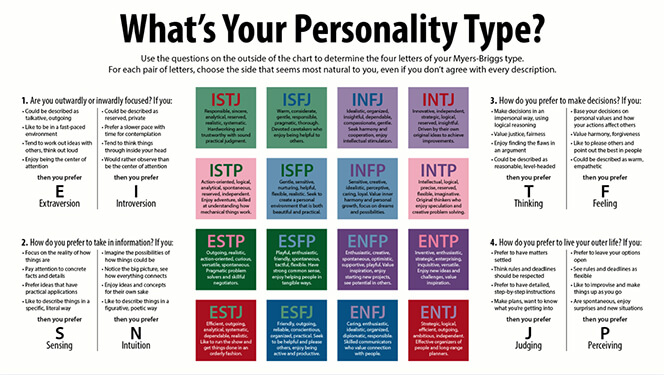Personality Tests: Using Myers Briggs

We've shown you a few types of personality tests that companies use to assess candidates. Next is the Meyers-Briggs Type Indicator or MBTI test.
Oftentimes it's referred to as simply "Myers-Briggs." The test, developed in the 1940s, contains multiple choice questions. Your score then places you into 1 of 16 categories.
There are four dimensions in the MBTI test:
- Extraversion (E) vs. Introversion (I)
- Sensing (S) vs. Intuition (N)
- Thinking (T) vs. Feeling (F)
- Judging (J) vs. Perceiving (P)
The first dimension measures where you get your energy. Introversion (I) means you get your energy from within, extroversion (E) gets it from outside sources.
The second scale is how you take in information. Sensing (S) means from within, while Intuition (N) is from outside of yourself. Decision making styles include thinking and feeling.
Thinking (T) is logical. Feeling (F) involves being more empathetic. How do you live your outer life? This is where judging and perceiving come in. Judging (J) means you like order to your life. Perceiving (P) demonstrates that you have an open attitude towards life.
These dimensions are placed on a spectrum. An MBTI score puts you into a category in each of the above dimensions. For example, you may be categorized as INFP.
This means your personality includes more Introversion (I), Intuition (N), Feeling (F), and Perceiving (P) characteristics. This would be different from someone who is ESTJ.
From a job search perspective, there are several points to consider when it comes to personality tests. Understanding how you're viewed through these tests can help you from a self-awareness standpoint.
This is important since some companies do use them as part of their recruitment process. Taking a Myers-Briggs test for a company gives them an opportunity to put you into a bucket. It's a way to get some idea of where you may fit within the organization.
Keep in mind that Myers-Briggs and similar assessment tools are a form of pseudoscience. This form of assessment doesn't focus on your job skills.
It's a way to describe or explain things with metaphors, but without clinical proof. And pseudoscience can give credibility to concepts that are discriminatory. For example, phrenology is the belief that measuring the shape of people's heads can tell you about their mental fitness.
This discredited practice was used by some to explain why they believed Black people were inferior to white people.
You can't hack personality tests.
This is because you don't know what attributes a company is looking for unless you have inside information from a trusted source.
This means that if they're going to discriminate against you because of your perceived personality you can't do anything about it. That said, knowing your personality type is an important aspect of the job search because it may give you a window into what a company may perceive to be important.
Be cautious of companies that place an emphasis on MBTI or other personality tests to determine who's qualified for a role.

Read on for more ways to make your job search a success: Finding Your DISC Personality Test Style
Individualize employee pay based on unique job requirements and personal qualifications.
Get the latest market pricing for benchmark jobs and jobs in your industry.
Analyze the market and your qualifications to negotiate your salary with confidence.
Search thousands of open positions to find your next opportunity.



